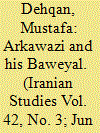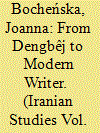|
|
|
Sort Order |
|
|
|
Items / Page
|
|
|
|
|
|
|
| Srl | Item |
| 1 |
ID:
089056


|
|
|
|
|
| Publication |
2009.
|
| Summary/Abstract |
The study of southern Kurdish literature is largely dominated by a bipolar perspective. Literature in southern Kurdistan is mostly, if not exclusively viewed in the context of relations between Iran on the one hand and, on the other, Iraq, the local states of the eighteenth and nineteenth centuries. To be sure, Iran acquired a dominant role in southern Kurdistan, yet it is also considered to have been the only dynamic factor in southern Kurdish dialect, while the Iraqi regions are supposed to have fulfilled an essentially passive one. This article presents the most well-known poem of Arkaw z?, a southern Kurdish poet from Pi tiku, an Iranian region of southern Kurdistan. It transcribes, translates, and glosses a Feyl elegiac text in which the poet describes the death of his son. Notwithstanding my dialectological purpose, the article may also provide some raw material for the historians.
|
|
|
|
|
|
|
|
|
|
|
|
|
|
|
|
| 2 |
ID:
186907


|
|
|
|
|
| Summary/Abstract |
Based on a textual analysis of the selected works of two writers from Turkey, Mehmed Uzun (1953–2007) and Mehmet Dicle (b.1977), as well as interviews with Kurdish writers and folklore collectors, this study focuses on the links between Kurdish folklore and modern Kurdish literature. Following Gregory Ashcroft's take on heritage, I argue that Kurdish writers’ approach to folkloric motives has evolved through the impact of growing literary experience, inspiration from world literature and deepening knowledge of the Kurdish oral tradition. What is more, Kurdish literature can be treated as an example of cultural and language revitalization, which – according to Justyna Olko – is based on acting in and through the heritage language. Following Doreen Massey's concept of a progressive sense of place, I identify Uzun and Dicle's strategy as linking the local to the universal, suggesting that Kurdish literature should be analyzed within the context of a political geography beyond nationalism.
|
|
|
|
|
|
|
|
|
|
|
|
|
|
|
|
| 3 |
ID:
190222


|
|
|
|
|
| Summary/Abstract |
This paper explores the concepts and norms of gender and sexuality in Ehmedê Xanî's 17th-century mathnawi poem Mem û Zîn, nowadays regarded as the Kurdish national epic. A reading of this poem with the aid of the conceptual tools of gender studies and the history of sexuality reveals how different its norms and concepts are not only from modern Kurdish ones, but also from those of classical Persian literature. Although the poem does not hint at any taboo concerning male love for beardless boys, it does display a remarkable asymmetry between male and female same-sex desire; it also displays distinct views of legitimate and transgressive sexuality. Thus, this poem encourages a more historicizing view of the gendered and sexual dimensions of modern (Kurdish and other) nationalism, and a greater attention for the distinct characteristics of vernacular literatures within the premodern ‘Persianate cosmopolitan.’
|
|
|
|
|
|
|
|
|
|
|
|
|
|
|
|
|
|
|
|
|